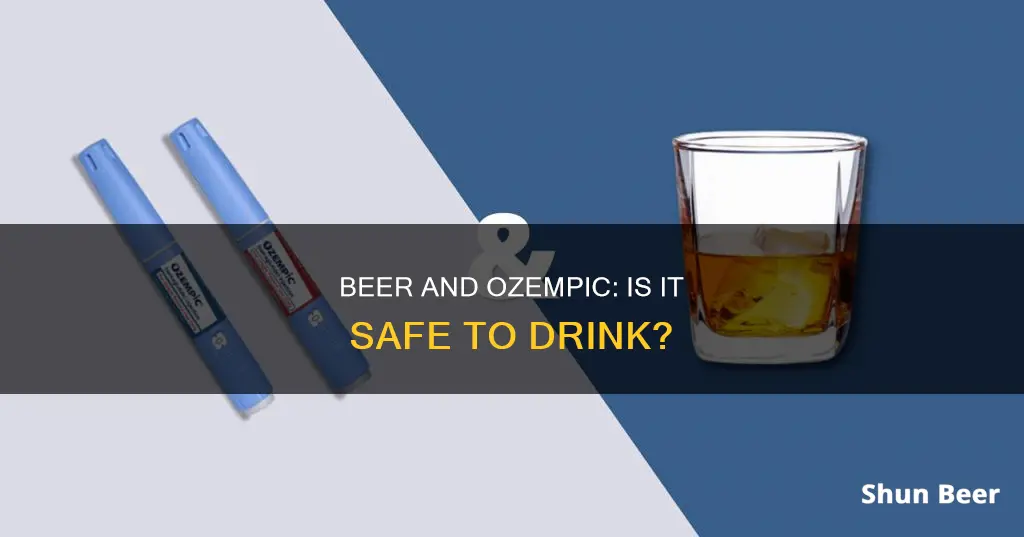
Ozempic is a medication that can be prescribed to treat Type 2 diabetes and aid weight loss. It is a glucagon-like peptide-1 (GLP-1) receptor agonist, which means it mimics the body's natural GLP-1 hormone. While there is no direct interaction between alcohol and Ozempic, combining the two may affect how the medication works in your body. This article will explore the potential risks of drinking beer or other alcoholic beverages while taking Ozempic.
| Characteristics | Values |
|---|---|
| Can you drink beer when taking Ozempic? | Yes, but it is not risk-free. |
| Ozempic's effect on the desire to drink alcohol | Some people taking Ozempic report losing their taste for alcohol. |
| Alcohol's effect on the body when combined with Ozempic | Alcohol may worsen common Ozempic side effects such as nausea, vomiting, and stomach upset. |
| Alcohol's effect on blood sugar levels when combined with Ozempic | Alcohol can increase the risk of hypoglycemia when taking Ozempic. |
| Ozempic's effect on weight loss when combined with alcohol | Alcohol may interfere with potential weight loss from Ozempic. |
| Ozempic's effect on the heart when combined with alcohol | Alcohol may interfere with potential heart-related benefits from Ozempic. |
| Recommendations when drinking alcohol while taking Ozempic | Drink with food, stay hydrated, try mocktails, monitor intake, and choose lower-alcohol drinks. |
What You'll Learn
- Ozempic may reduce your desire to drink alcohol
- Alcohol may worsen common Ozempic side effects
- Alcohol may increase the risk of low blood glucose with Ozempic
- Both alcohol and Ozempic have a risk of pancreatitis and kidney damage
- You may lose some of Ozempic's benefits if you're drinking alcohol regularly

Ozempic may reduce your desire to drink alcohol
Ozempic (semaglutide) is a medication used to treat Type 2 diabetes and aid weight loss. It is known to have some side effects, including nausea, vomiting, and a reduced desire to drink alcohol.
The medication works by mimicking a gut hormone called glucagon-like peptide-1 (GLP-1), which has targets in the pancreas, gut, liver, and brain. When you drink alcohol, dopamine is released, activating the brain's reward system and creating a "feel-good" sensation. However, GLP-1 targets in the reward-related areas of the brain may block or lessen this dopamine boost, reducing the pleasurable effects of alcohol.
Several people taking Ozempic have reported a decrease in their desire to consume alcohol or a complete loss of their taste for it. Animal studies have also shown that medications similar to Ozempic may reduce alcohol intake, and researchers are currently investigating Ozempic as a potential treatment for alcohol use disorder.
While there is no direct interaction between alcohol and Ozempic, combining the two may increase the risk of certain side effects, such as nausea, vomiting, and stomach upset. Additionally, long-term or heavy alcohol use, when combined with Ozempic, may increase the risk of serious complications such as pancreatitis and kidney damage.
Therefore, it is generally recommended to stick to moderate alcohol consumption while taking Ozempic and consult a healthcare provider to discuss what is considered a safe amount for the individual.
Drinking Beer in California Parks: What's Allowed?
You may want to see also

Alcohol may worsen common Ozempic side effects
Alcohol can irritate the stomach lining and slow down how quickly food leaves the stomach. This can lead to nausea, vomiting, and stomach pain, which may be particularly unpleasant for those already experiencing these side effects from Ozempic. It is recommended that those taking Ozempic wait until their body has adjusted to the medication before drinking alcohol.
Additionally, Ozempic can cause digestion-related side effects that are usually worse when first starting treatment or after dosage increases. These side effects typically improve over time, but drinking alcohol may slow down this process.
To reduce the risk of side effects, it is advised to stick to moderate alcohol consumption, drink with food, stay hydrated, and consult a healthcare provider.
Gluten Allergy and Beer: Is It Safe to Drink?
You may want to see also

Alcohol may increase the risk of low blood glucose with Ozempic
If you are taking Ozempic and decide to drink alcohol, it is important to follow your healthcare provider's instructions for what is considered a safe amount of alcohol for you. It is recommended to stick to moderate alcohol consumption, which is defined as one alcoholic drink per day for women and two alcoholic drinks per day for men. An alcoholic drink is defined as one 12 oz beer, one 5 oz glass of wine, or 1.5 oz of spirits.
To minimize the risk of low blood glucose, it is important to avoid drinking alcohol on an empty stomach and to stay hydrated by drinking plenty of water. It is also a good idea to have some fast-acting carbohydrates, such as glucose tablets, on hand in case your blood glucose levels drop too low.
Additionally, it is important to monitor your blood glucose levels before, during, and after drinking to identify and manage hypoglycemia quickly. If you are experiencing low blood sugar, it is recommended to avoid drinking alcohol.
Furthermore, combining Ozempic with long-term or heavy alcohol use may increase the risk of other serious complications, such as pancreatitis and kidney damage. Therefore, it is generally not advised to drink alcohol while on medication. However, if you choose to drink in moderation, following the guidelines and precautions outlined above can help reduce the risk of potential side effects.
Ranitidine and Beer: Safe to Mix?
You may want to see also

Both alcohol and Ozempic have a risk of pancreatitis and kidney damage
Alcohol and Ozempic can both cause pancreatitis and kidney damage. While Ozempic can have positive effects on the kidneys, there is a risk of kidney damage for certain people. This risk is higher if you become dehydrated due to fluid loss from side effects like nausea, vomiting, and/or diarrhea.
Long-term or heavy alcohol use has been linked to pancreatitis and kidney damage. Alcohol can cause the digestive enzymes in the pancreas to activate too soon, leading to inflammation and swelling of the organ. It can also lead to high blood pressure, which is a risk factor for kidney disease.
Although there is no direct interaction between alcohol and Ozempic, combining the two may increase the risk of serious side effects. Therefore, it is recommended to stick to moderate alcohol consumption and consult a healthcare provider to determine what is considered a safe amount for you.
Drinking Beer on San Diego Beaches: What's Allowed?
You may want to see also

You may lose some of Ozempic's benefits if you're drinking alcohol regularly
Ozempic is a medication that is used to treat Type 2 diabetes and aid weight loss. It is a glucagon-like peptide-1 (GLP-1) receptor agonist, which means it mimics the body's natural GLP-1 hormone. This hormone has targets in the pancreas, gut, liver, and brain. By activating the GLP-1 receptors, Ozempic stimulates insulin release and helps to lower blood sugar levels. It also slows down how quickly the stomach empties after a meal, reducing appetite and promoting weight loss.
While there is no direct interaction between alcohol and Ozempic, regular alcohol consumption can decrease the medication's effectiveness and increase side effects. Alcohol can affect blood sugar levels and cause weight gain, which can interfere with the benefits of Ozempic. Here are some ways that regular alcohol consumption may reduce the benefits of Ozempic:
- Weight gain: Alcoholic beverages contain extra calories and can stimulate your appetite, leading to weight gain. This can counteract the weight-loss benefits of Ozempic.
- Blood sugar fluctuations: Alcohol can interfere with Ozempic's ability to regulate blood sugar levels, causing spikes or drops in blood sugar. This can be especially dangerous for people with diabetes, increasing the risk of hypoglycemia (low blood sugar) or hyperglycemia (high blood sugar).
- Gastrointestinal issues: Alcohol can irritate the gastrointestinal tract and worsen symptoms such as nausea, vomiting, and diarrhea, which are common side effects of Ozempic.
- Reduced liver function: Both alcohol and Ozempic can affect liver enzymes, and combining them may lead to reduced liver function.
- Pancreatitis and kidney damage: While rare, there is a small increased risk of pancreatitis (inflammation of the pancreas) when consuming alcohol with Ozempic. Additionally, excessive alcohol use can damage the kidneys, and dehydration caused by alcohol can further impact kidney function.
It is important to note that occasional alcohol consumption may not be a cause for concern. However, regular and excessive alcohol consumption can interfere with the benefits of Ozempic. If you are taking Ozempic, it is recommended to stick to moderate alcohol consumption, avoid drinking on an empty stomach, stay hydrated, and consult with a healthcare provider to ensure it is safe for your individual health needs.
Drinking 16 Beers: Is It Possible or Dangerous?
You may want to see also
Frequently asked questions
There is no direct interaction between alcohol and Ozempic, and the FDA has not provided any warnings for drinking alcohol while taking Ozempic. However, drinking alcohol while taking Ozempic is not risk-free and may cause various medical issues. It is generally advised to stick to moderate alcohol consumption and consult a healthcare provider.
Drinking beer when taking Ozempic may result in reduced liver function, fluctuating blood sugar levels, worsened gastrointestinal issues, and reduced weight loss. It can also lead to more serious side effects such as pancreatitis and kidney damage if consumed in excess.
It is recommended to drink slowly and with food, stay hydrated by drinking water, and consider non-alcoholic alternatives. It is also important to monitor your blood sugar levels and consult your healthcare provider to ensure a safe amount of alcohol consumption.







